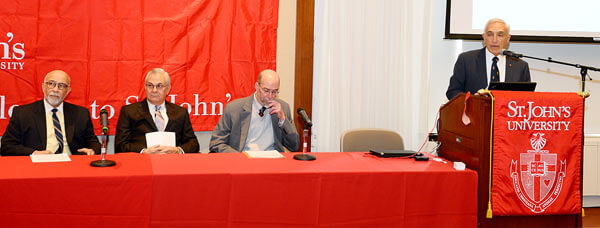By Phil Corso
Concerns over online bullying have become so prevalent in some circles that St. John’s University authored its own policy on the matter and dedicated an entire day to exploring its effects.
The college’s all-day cyberbullying conference Friday packed a room full of academics, administrators, professors and students discussing potential solutions to curb what some called an ongoing and undeniable trend on the Web. Experts from different corners of the academic world shared data and anecdotes at a panel discussion looking at different ways to alleviate Internet bullying.
“A vast majority of students believe that universities should educate the community about cyberbullying,” said John Molluzzo, a professor at Pace University. “I think that is pretty evident because it’s a very important thing.”
The conference was held as a follow-up to SJU’s most recent conference last year introducing the issue to the school community. This year’s event was designed to push the discussion further toward discovering possible solutions.
One of those solutions, Molluzo said, came in the form of the university’s recently drafted cyberbullying policy, which he said Pace administrators were working on as a model for their own policy.
The university included “computing and cyber harassment” in its Student Code of Conduct among the ranks of other violations like assault, drug abuse, hazing and sexual misconduct, defining it as “using information and communication technologies as a means of intimidation, harassment or unwarranted interruption.”
Molluzzo also offered statistics gathered from Pace University, providing a glimpse into how faculty members and students there view online bullying as a serious and growing threat in the Information Age. In his presentation, he revealed that more than half of students believed there should be more severe penalties for cyberbullying and most administrators were in favor of better education on the issue across the board.
Outside the conference, a display of student posters outlined different methods that could combat online bullying to complement the all-day conference.
The discussion over cyberbullying hit closer to Queens earlier this year when Queens Village 12-year-old Gabrielle Molina killed herself after authorities suspected she was subject to online harassment.
Her death spurred an immediate response from borough lawmakers, including City Councilman Mark Weprin (D-Oakland Gardens), who has been calling for tougher consequences for cyberbullying in city schools.
“A slap on the wrist is not enough,” Weprin said. “The [city Education Department] needs to adopt stronger disciplinary measures and clear consequences so that students will think twice before posting or commenting on a humiliating photo or online video of another student.”
Reach reporter Phil Corso by e-mail at pcorso@cnglocal.com or by phone at 718-260-4573.


































